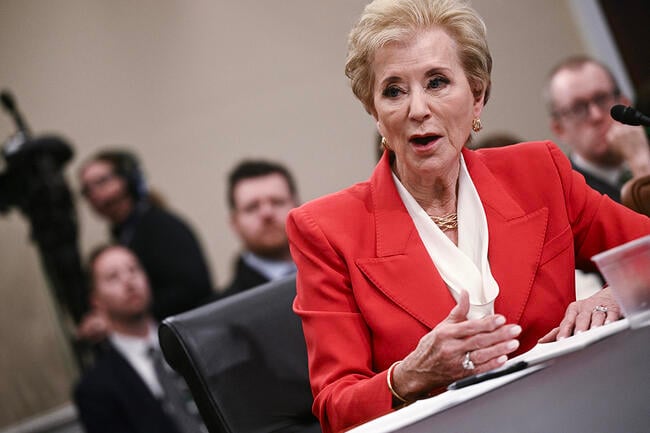You have /5 articles left.
Sign up for a free account or log in.

Education Secretary Linda McMahon defended cuts to her department at a House hearing Wednesday.
Brendan Smialowski/AFP/Getty Images
U.S. Secretary of Education Linda McMahon defended sweeping layoffs at the Education Department and the Trump administration’s proposed 15 percent cut to the department’s budget at a House appropriations committee hearing Wednesday, maintaining that the department needs a major overhaul and that education is best managed by local governments.
In exchanges that often grew tense, Democrats pressed McMahon on the consequences of the administration’s decision to lay off nearly half of her department’s staff, the feasibility of her proposal to hand much of its responsibilities to state and local governments, massive cuts to universities’ federal research grants and contracts, and cuts to federal student aid eligibility and work-study funding.
In an opening salvo, ranking Democratic representative Rosa DeLauro of Connecticut accused McMahon of “recklessly incapacitating the department you lead” and of violating the Constitution by doing so.
“You are usurping Congress’s authority and infringing on Congress’s power of the purse,” DeLauro said. “Your actions are lawless, they reek of disdain for public education and they are hurting the most vulnerable in our nation.”
McMahon largely rebuffed calls to walk back proposed education cuts, including some from her own party, and reiterated that her role was to facilitate the department’s “final mission” to make itself irrelevant.
“We seek to shrink federal bureaucracy, save taxpayer money and empower states … to manage education in this country,” she said in her opening statement. “With your partnership, the fiscal year 2026 budget will take a significant step toward that goal.”
Throughout the hearing, Democrats hammered McMahon over the Education Department’s massive reduction in force this spring. The secretary provided some previously undisclosed details about the layoffs, including that more than 2,000 of the affected employees—about two-thirds to three-quarters of the total—were fired by the Department of Government Efficiency. She added that the department had to rehire 74 of them.
But she pushed back on Democrats’ assertions that Elon Musk’s DOGE was largely responsible for the layoffs.
“I run the department,” she said. “DOGE does not run the department.”
As the hearing went on, Democrats grew increasingly frustrated at McMahon’s unflinching defense of the Trump administration’s proposed elimination of most of her own department. One exchange escalated when Pennsylvania Democratic representative Madeleine Dean, who was just appointed to the committee in January, repeatedly interrupted McMahon to ask why she “didn’t want to protect students” of color, with disabilities or from low-income families.
“Why in God’s name do you want to shutter [the Education Department]?” she asked, exasperated. “Why are you in this job at all if you don’t have a dedication to the future of our children? Why?”
McMahon said she and President Donald Trump both understand that they can’t eliminate the department without congressional approval, but that she hopes to work with Congress to facilitate a “wind-down of the bureaucracy.”
Democrats also expressed concern over the department’s responsiveness to civil rights complaints from vulnerable students, especially after the department laid off a significant number of Office for Civil Rights employees and eliminated more than half its regional offices, which usually field complaints.
McMahon replied that they’d inherited a “backlog of cases” from the Biden administration, but that even with the cuts they were “working more efficiently” through them. But the department still has more than 12,000 open civil rights cases and has made almost no headway in addressing them, according to a federal database of complaints
Republican members were largely supportive of her efforts. Rep. John Moolenaar of Michigan asked for more collaboration in combating the “influence of the Chinese Communist Party” on American campuses.
Some asked McMahon to detail her efforts to punish colleges over allegedly permitting antisemitism on campus. In response, McMahon said she’d met with the current Columbia University president Claire Shipman twice, and that she’d commended her over the university’s swift and harsh police crackdown on a student pro-Palestine protest earlier this month. But while the university suspended many of the student participants, McMahon said she is pushing administrators to expel them instead.
“We have leverage to withhold some of that federal funding or to cancel some of the grants, and we will do that unless it can be proven that these colleges and universities are going to respect all rights,” she said. “We’ve seen that kind of action can deliver results.”
One Republican committee member, however, pushed back on one proposed budget cut: the elimination of the TRIO program, a federal initiative that helps first-generation and low-income students get to and through college.
Rep. Mike Simpson of Idaho said that while he agreed with many of the secretary’s priorities, he was concerned about the cuts to federal outreach programs for underserved students. He asked McMahon to consider removing the TRIO cuts from the budget proposal.
“It is one of the most effective programs in the federal government. Other government programs could learn from TRIO,” he said. “This is the GI Bill for low-income communities.”
McMahon said she believes the need for programs like TRIO “is not as strong today” because universities themselves are doing their own outreach to underrepresented communities.
“And if they’re not, they should be,” she added.
But universities are retreating from their community outreach programs thanks to the department’s Dear Colleague letter that threatened to pull federal funding over diversity initiatives, as well as a raft of anti-DEI legislation in Republican-led states.
McMahon also said that the federal government should be focusing less on getting students into college and more on opening up opportunities for low-income students to pursue career and technical training as an alternative. That shift from college prep to direct career pipelines was a recurring theme of McMahon’s testimony.
“We focused on college and degree and we made trade skills something you go into if you can’t really make it into college,” she said. “While I still believe in secondary education and higher education for many students, I think that’s not the right pathway for every single student.”
When asked about shifting the priorities of the Office of Federal Student Aid away from student debt relief, she said she’s “spent quite a lot of effort” restructuring the office and focusing on enforcing repayment. She said the department has already collected around $100 million in student loan payments since restarting involuntary collections earlier this month.
She also said that getting the Free Application for Federal Student Aid ready for a smooth rollout next year is a priority for the current FSA. But many financial aid officers are worried that the draconian cuts to the FSA are already derailing next year’s FAFSA process.
A new survey of more than 900 aid professionals found that a third are experiencing significant delays in processing their applications to participate in the federal aid system next year. One financial aid leader told Inside Higher Ed on Wednesday that many of their colleagues applying for recertification were stuck in an indefinite hiatus—and that the Education Department’s decision to shutter most of FSA’s regional offices left them in the dark about how to move ahead.





